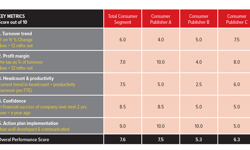While Evelyn Webster’s first decision was to cut jobs and freeze salaries, her focus over the intervening months has been less on the immediate challenges posed by recession and more on capitalising on changing market conditions to achieve a tangible strategic, long term gain.
"There's no point worrying," she says emphatically as we talk in her spacious eyrie on the tenth floor of IPC's stunning Blue Fin Building. "We're in a recession and that's the way it is. So let's think what we can do to affect the most positive changes we can within our organisation as we move forward."
With the grassy designer roof garden just outside her window with its panoramic views of London beyond it would be easy to forget that, like every other media owner, IPC is currently grappling with the knock-on effects of the recession, were it not for Webster's clarity of vision and firm focus on the task in hand. But make no mistake, nine months in and IPC's chief executive - who joined the business back in 1992 - has her sights firmly fixed on the bigger picture.
Battening down the hatches
"The very first thing I did back in January was look at the structure of the company and how we were working. And I took some very tough decisions early on," she explains.
"We needed to right size and ensure the company's structure would enable us to respond to changes in the market. A lot of the things I did early on one could say were negative - making decisions about job cuts and salary freezes to ensure we were operating at the right cost base, but really they were positives to see us through this year bearing in mind how difficult we knew this year would be."
Just under one hundred jobs were cut from a staff total of 2,100. A company-wide salary freeze was implemented amongst those earning £30,000 a year or over, and all staff were given an extra two days holiday. Has it worked? "Absolutely," Webster insists. "As we are currently trading, I am not anticipating a huge swathe of further job cuts."
Since then, Webster has worked hard on internal communications to spell out both the company's broad objectives and specific goals and objectives for each team. "I spend a lot of time communicating, this is what we are doing, why and this is what you can do to ensure IPC reaches its objectives," she says. "I'm firm on giving people absolute clarity on their role."
But IPC's austerity measures need to be considered within a broader context.
The company already had an efficiency-focused culture. A few years back, for example, the company began removing the role of production head from its titles.
"We now have 'complete digital pages', so when we send pages down to the repro house we are effectively locking them down as complete files. Responsibility for this now rests with a number of people across editorial. This has helped improve the efficiency of our workflow through the editorial teams," Webster explains.
Multi-skilling
Another emphasis has been on multi-skilling our creative teams so they are creating content for every platform IPC publishes across. "This has required quite heavy investment in our people but we now have single central creative teams working on our 80-plus brands," she says.
Increasingly, IPC is recruiting people either who have an aptitude for, direct experience of or a specific desire to work in multimedia. "It's certainly changing job descriptions," Webster continues. But then publishing always has been and always will be a constant evolution. "Whenever a vacancy arises, we challenge ourselves, 'Do we really need to fill this vacancy or can we work in a more efficient or effective way?'"
This is not just a function of the economic situation, she adds. Rather, it is a reflection of the company's ongoing goal - and the legacy Webster has inherited from her predecessor, Sylvia Auton - to evolve from magazine publisher to cross-platform content creator. And this, in turn, has less to do with cost savings than keeping pace with consumer demand in a 21st century multimedia marketplace.
Multi-platform approach
"Good strategies don't change, and ours is simple," she says. "We aim to create and produce the very best magazines that continually reinvent themselves and innovate to ensure they meet the evolving needs of the consumers they serve. An important part of this is leveraging our assets across all platforms to meet consumer needs in whatever way consumers want, and this is where training and developing our team and equipping them with the skills to respond to market changes comes in."
Webster isn't just talking about digital, although she believes significant opportunities exist online. "If you see the consumer at the heart of everything, as IPC does, then you look at everything - radio, TV, events, training courses. Because 'multi-platform' means different things to different people," she explains.
Some of the audiences IPC serves, such as readers of women's weeklies, see the printed product as "their meat", she continues: "For them, the magazine is an essential ten minutes-worth of me time".
Others, such as men's magazine readers, however, are increasingly looking to consume their content via digital platforms. For specialist titles, meanwhile, the desire for involvement with a subject fuels a portfolio of associated products. IPC-owned Decanter magazine, for example, is a powerful cross-platform brand with 50% of revenues generated by the printed product while the balance comes from awards, courses and events.
Digital developments
That said, digital is an important - and growing - part of IPC's business. Two years ago, IPC Connect launched mainstream women's portal goodtoknow.co.uk. More recently, in May 2009, it re-launched InStyle.co.uk.
"The company's longer-standing digital assets have been successfully monetised through advertising and sponsorship," Webster explains. "But the digital business is not purely about advertising. We are also driving revenues from affiliate partnerships (selling content from third parties, for example dating or bingo on goodtoknow.co.uk), lead generating data and paid-for content - an area I'm particular keen to explore further."
Online video presents another opportunity. IPC currently operates over 25 YouTube channels, for example. To date, its brands - including Marie Claire, Decanter and What's on TV - have uploaded over 2,000 videos onto YouTube generating more than 38 million views. This, in turn, has lead to IPC striking a ground-breaking revenue-share partnership with YouTube to sell advertising around popular content for titles including NME and Nuts.
"A big focus is cross-platform advertising deals," Webster adds. "There is a clear benefit to clients in buying into a deeper package of activities around a brand - competitions, micro sites, and so on. That's where they get real traction because advertisers like a trusted brand environment."
And not forgetting print
So far so good. But where does all of this leave print - a medium battered especially hard by the economic downturn with advertising revenue down and sales in certain sectors, notably women's monthlies and men's magazines, in decline?
"I have to be very careful," Webster concedes. "Because obviously we have grown up as a business as a magazine company. And magazines are still very valuable, very buoyant and a very profitable business to be in. But it is a fact that we are now in the content business. And moving forward, an increasing proportion of our turnover will come from non-print activities."
Despite this, she insists, the future for the printed magazine looks bright: "I have a real passion for magazine and still firmly believe there is a positive future for magazines moving forward. Personally, I think the industry could do more to sell the medium harder, but in a tough year, it is a fact that publishing companies must choose what to invest in."
For some, this has meant joint industry initiatives to sell the medium as a whole have taken a back seat. At an individual level, however, IPC remains committed to continuing to research into consumer engagement with the printed medium, and the company still spends a lot of time talking to its commercial partners about the value of magazines.
Reduced launch activity
One area of activity that both raises the profile of magazine publishing and attracts new readers to the medium is new product launches - an area of investment that, of course, has been significantly scaled back in response to the current tough economic conditions. And this, in turn, has left the sector in a bit of a Catch 22 situation. Webster's view on this, however, is pragmatic to say the least.
"The complete magazines category has grown significantly over the past seven to eight years - it's been quite extraordinary. And this growth has come predominantly, though not exclusively, from new magazine launches. What we are now seeing, however, is a natural contraction following a period of heightened activity," she believes. "This is not just about recession, but because the launch and noise rate of a few years ago has slowed."
Launches have not stopped completely. IPC launched SuperYacht World and SuperYacht Business in 2008 and is developing a number of launches still scheduled for later this year - including a one-shot food title called Woman & Home Dinner Tonight, launching in September - although at press-time further details were still under wraps.
Without doubt, the shape of the magazine market will change over the coming years. "Certain categories will grow and others contract. A number of specialist markets are going up still: baby boomer women's titles, for example – Woman & Home is enjoying continued growth," Webster observes.
"But even in the men's sector, where declining print sales are fuelled by readers wanting greater access to content on different platforms, especially online - overall magazine sales are still a million plus more a month than was the case in 2003. As I say, the prospect for magazines is good."










